Venezuelan polling firm Meganálisis found in a study published this week that nearly 80 percent of the country believes that members of opposition movements against socialist dictator Nicolás Maduro are either “sellouts” or themselves chavistas, a catastrophic lack in trust that makes change in the country nearly impossible.
Meganálisis CEO Rubén Chirino Leañez told Breitbart News on Monday that the results of his firm’s latest survey are the result of the opposition doing “absolutely nothing” to combat socialist ideology and the result of “always falling into the same situation of dialogue and negotiation [with the regime] that ends up costing them big politically.”
Maduro, who became president in 2013, has ruled Venezuela with minimal resistance since he, with Russian and Chinese help, successfully crushed anti-socialist protests that lasted mostly from 2016 to 2018. He has not legally been president of the country since 2019, however, when the National Assembly used its constitutional power to replace him with Interim President Juan Guaidó in January of that year.
Guaidó — who at the time belonged to a full member party of the Socialist International, Popular Will — failed to secure the loyalty of the armed forces, the police, or any other government agency that would allow him to govern. While he technically remains president of the country, his tenure has been defined by inaction and betrayal on the part of other opposition leaders. In November, members of the socialist opposition Democratic Unity Roundtable (MUD) chose to participate in sham elections organized by Maduro against Guaidó’s meek objection. A month later, his top diplomat, Julio Borges, resigned, proclaiming that Maduro had “created” an opposition “to his specifications” and Guaidó’s political group “should disappear completely.”
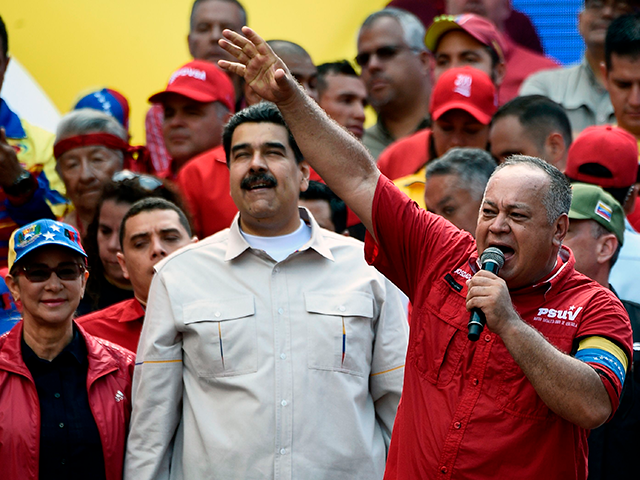
The president of the Venezuelan National Constituent Assembly Diosdado Cabello (R) speaks next to Venezuela’s President Nicolas Maduro and First Lady Cilia Flores (L) during a rally at the Miraflores Palace in Caracas, Venezuela on April 6, 2019. (FEDERICO PARRA/AFP via Getty Images)
The latest Meganálisis national poll, published this week but conducted between March 22 and March 31, found little hope among regular Venezuelan citizens that any political opposition could change the fate of the country.
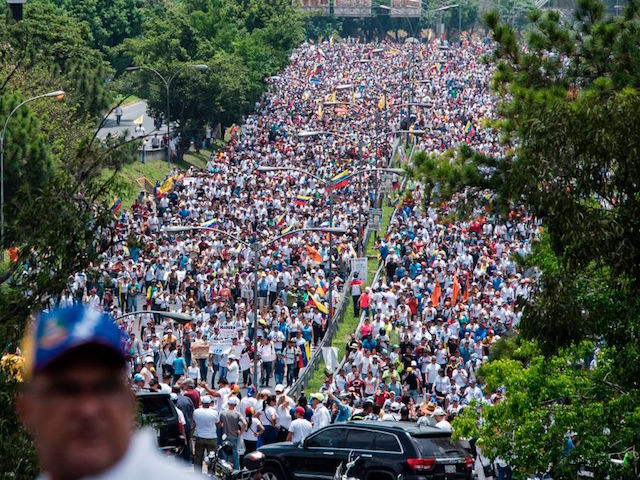
Thousands of people rally against Venezuelan President Nicolas Maduro along the Francisco Fajardo highway in eastern Caracas on April 19, 2017. (CARLOS BECERRA/AFP/Getty Images)
Asked, “When you see people say that the majority of opposition political parties are sellouts to the government and work for chavismo, do you think that is true?,” 78.1 percent of respondents said yes, while 16.5 percent said no and another 5.4 percent said they did not know.
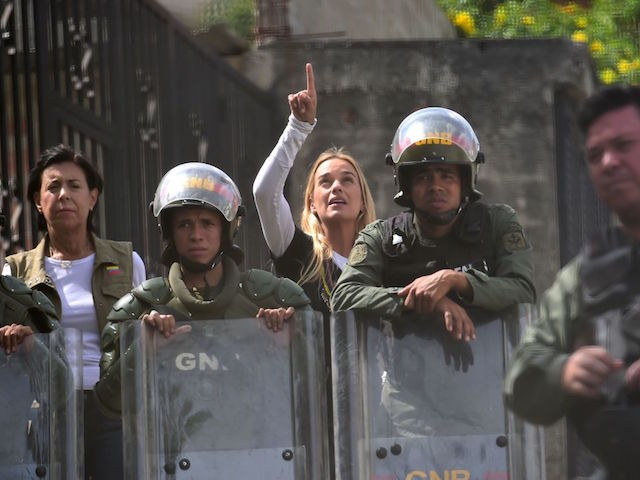
Jailed opposition leader Leopoldo Lopez’s wife Lilian Tintori (C) and mother Antonieta Mendoza de Lopez (L) are stopped by the National Guard 500 metres from the entrance to the Ramo Verde penitentiary in Los Teques, 30 km east of Caracas, where Lopez is imprisoned, on April 28, 2017. (RONALDO SCHEMIDT/AFP/Getty Images)
Slightly more respondents — 82.3 percent — answered “no” to, “Do you trust opposition politicians?” That number increased by 7.8 percent in the last six months.
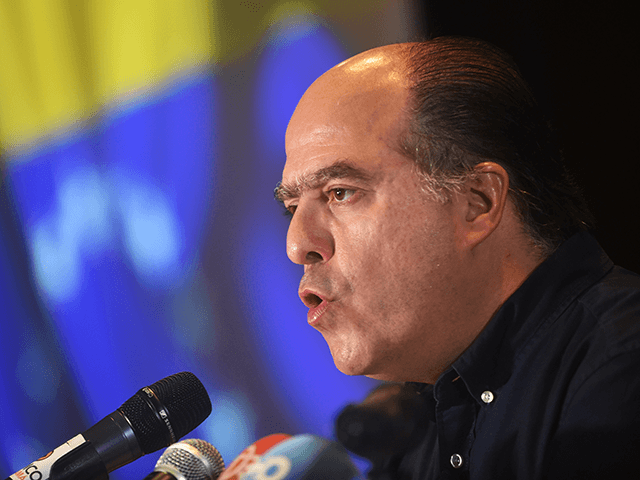
The former president of Venezuela’s National Assembly, Julio Borges, speaks during a press conference in Panama City on February 23, 2018. (RODRIGO ARANGUA/AFP via Getty Images)
The survey also found that disgust with the opposition was not translating into any popularity for Maduro, who has spearheaded the country’s descent from Latin America’s wealthiest country to the source of its largest migrant crisis, a country where food shortages and power outages have been a regular occurrence for years.
Asked, “Do you think that with Maduro and chavismo in power, Venezuela will be able to progress, have a better future, and motivate those who left the country to return?” 71.5 percent said no, while only 16.2 percent said yes, numbers roughly comparable to the disinterest in supporting the opposition.
“Who has created that lack of trust for opposition politicians? All of them together – all of the erratic ways in which they have acted, all the contradictory actions have led to that distrust,” Chirino told Breitbart News on Monday. “For a while they have been stuck in this rut of error after error, one after the other and incongruences, and always falling in the same situation of dialogue and negotiation that ends up costing them big politically.”
Chirino added that the opposition is doing “absolutely nothing” to end socialism and have become “appendices” to the existing socialist system. “That is also part of the element of distrust — they end up not being a political offering totally against socialism. On the contrary they are appendices, a variant, or often just perceived as the same thing,” he said.
Chirino suggested that, should they seek the people’s support, opposition politicians need to pursue “a total rupture with this state of things, with this way of doing politics.” They have to offer, he concluded, “a different way of building a government than socialism,” mentioning as a positive example the rise of classical liberal economist Javier Milei in neighboring Argentina. Milei’s rhetoric centers around opposing leftism in all its forms, calling socialism an “infestation” and a “disease” and regularly going on profane tirades calling leftists “envious” and “hate-filled.” Milei has promised not to maintain any relationship with communist China if elected because, “I don’t associate with dictators and communists” and has condemned those who do as anti-capitalist.
Milei has organized a movement called “Liberty Advances” in opposition to both the ruling socialist “Front for All” and the establishment center-right “Together for Change” coalition, fueling the first loss for the Argentine left in the Senate since 1983 in October. Polls show Milei’s party squarely in the race for the 2023 presidential election.
No such anti-communist strain of politics exists in Venezuela’s mainstream. Opposition leader María Corina Machado has attempted to organize a conservative front, often butting heads with Guaidó and the MUD, but has made few strides in coalescing anti-socialist energy around her party, Vente Venezuela.
Guaidó, in the meantime, has done little to address the concerns shown in the polling. Guaidó recently spoke to U.S. Secretary of State Antony Blinken, who pressured him to return to unpopular negotiations with Maduro.
“Secretary Blinken reaffirmed the U.S. commitment to the talks between the Maduro regime and the Unitary Platform as the best path for a return to democracy and for resolving Venezuela’s humanitarian crisis,” State Department spokesman Ned Price said on Monday. “The Secretary also reiterated U.S. support for the 2015 democratically elected National Assembly and for Guaidó as the Interim President of Venezuela.”
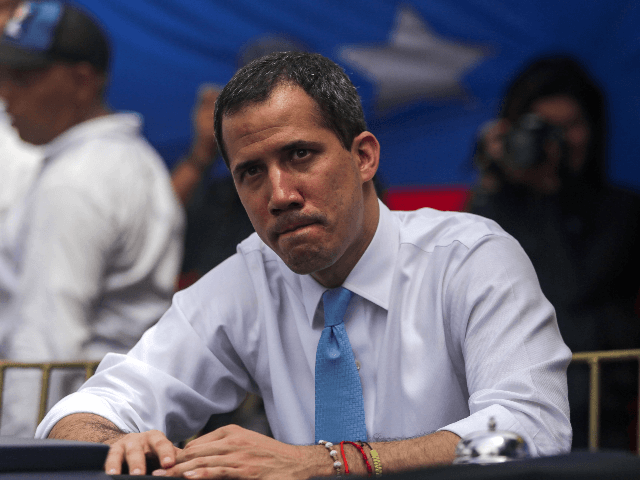
COMMENTS
Please let us know if you're having issues with commenting.